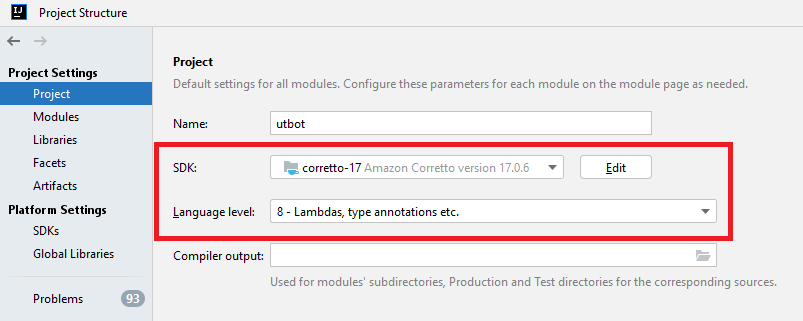-
Notifications
You must be signed in to change notification settings - Fork 45
Check system requirements
UnitTestBot works with Windows, Linux, and macOS. In most cases you should not worry about the compatibility with your operational system.
You have to install IntelliJ IDEA: for compatibility, see UnitTestBot on JetBrains Marketplace.
UnitTestBot supports JDK 1.8–17.
You have to install
-
IntelliJ IDEA (for compatibility, see UnitTestBot on JetBrains Marketplace);
-
JDK 17;
-
Kotlin 1.7.0 or later.
You also need to configure development environment:
-
JAVA_HOMEenvironment variable should contain the path to JDK 17 installation directory. -
PATHenvironment variable should contain the path to thebinfolder of JDK 17 installation directory. -
KOTLIN_HOMEenvironment variable should contain the path to thekotlincfolder of Kotlin (1.7.0 or later) installation directory. -
Project SDK should be set to JDK 17:
In you IntelliJ IDEA, click File > Project Structure, choose Project Settings > Project and set
SDK to JDK 17.
Make sure the Language level is still set to 8.
- Gradle SDK should be set to JDK 17:
In your IntelliJ IDEA, click File > Settings, choose Build, Execution, Deployment > Build Tools > Gradle and set Gradle JVM to JDK 17.
Note: if the environment variables lead to unsupported JDK or Kotlin versions, you won't be able to build the UnitTestBot project.
- Check system requirements
- Install or update plugin
- Generate tests with default configuration
- Fine-tune test generation
- Get use of test results
(redirect to /docs in main repo)
- Contributing guide
- Developer guide
- Naming and labeling conventions
- Interprocess debugging
- Interprocess logging
- UnitTestBot overall architecture
- Android Studio support
- Assumption mechanism
- Choosing language-specific IDE
- Code generation and rendering
- Fuzzing Platform (FP) Design
- Instrumented process API: handling errors and results
- UnitTestBot JavaScript plugin setup
- Night statistics monitoring
- RD for UnitTestBot
- Sandboxing
- UnitTestBot settings
- Speculative field non-nullability assumptions
- Symbolic analysis of static initializers
- Summarization module
- Taint analysis
- UnitTestBot decomposition
- UtUtils class
- UnitTestBot Family changes

